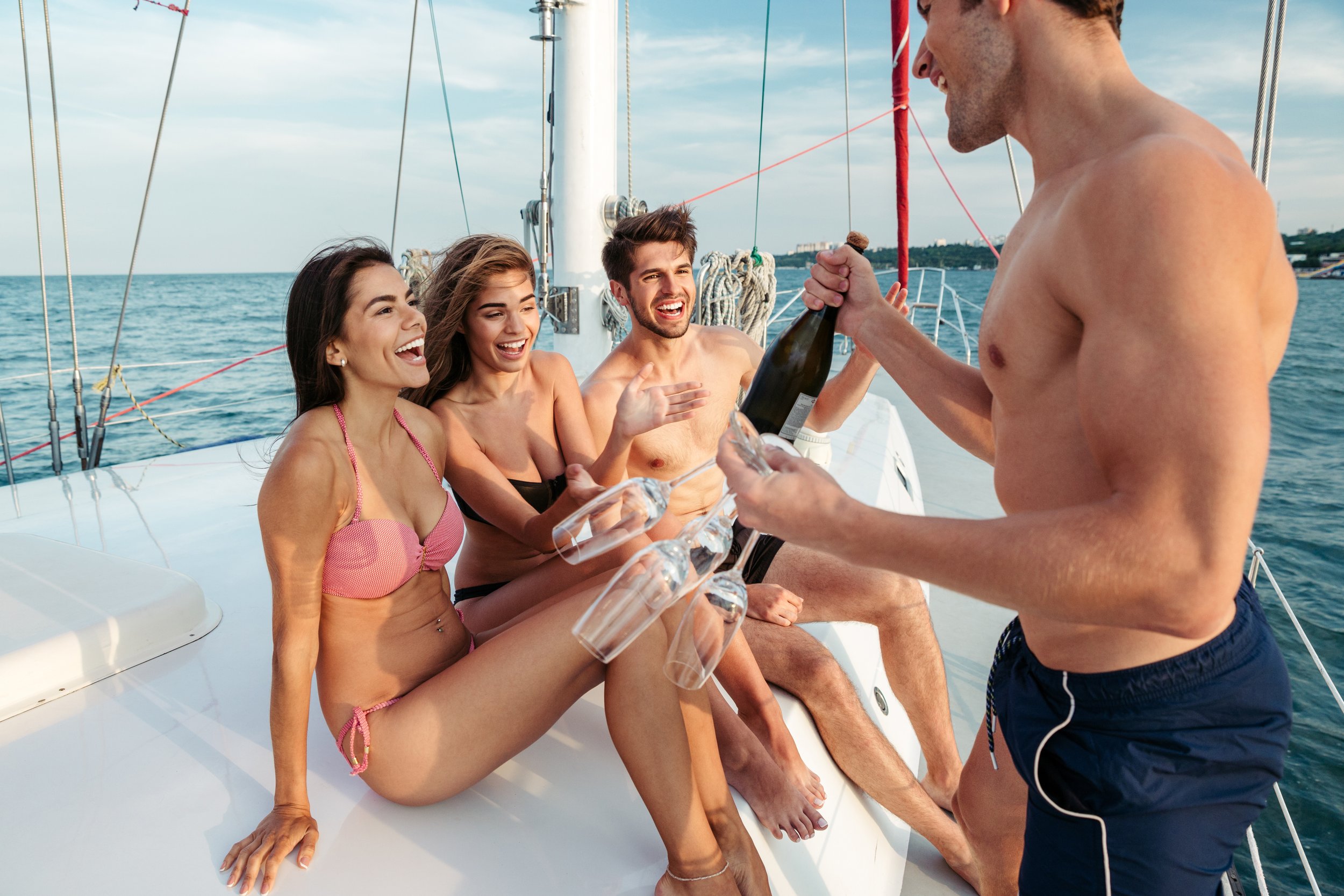How to Choose the Right Boat to Purchase for Your Lifestyle
Not all boats are created the same. Not all boats are used for the same purpose. Not all boats will meet your needs and match your lifestyle. If you are looking to purchase a boat and wondering, “What boat should I buy?" this article is here to help.
Matching Your Boating Activities to the Right Boat Type
Boating activities and boat choice go hand in hand. Choosing the right boat for you means knowing what you want to use the boat for. Obviously, a boat that is built for fishing is not necessarily going to be the best boat for watersports or cruising around.
Identifying your primary boating activities is going to help you find the right boat for enjoying those activities. If you have a family, then considering your family boating needs, especially when it comes to boating activities is important too.
Pros and Cons of Boat Types Based on Activity
Let’s look at comparing boat types based on what activity each type is best for and also what some of the downsides of different boat types might be.
Deck Boats
Designed with a wide bow and a hull that provides increased deck space and seating than other boat types. Provide versatility for accommodating a variety of activities, including fishing, watersports, cruising, lounging, and entertaining. Their versatility, though, can also be a drawback. Being able to accommodate everything means not accommodating anything specifically. So, if fishing is your passion or watersports are your main focus, other boats are more specifically designed to support those things.
Fishing Boats
If you love to fish and want a boat that will fully accommodate this activity, then purchasing a boat designed to help you catch more fish and manage all your gear can be a boon to your fishing lifestyle. They offer good water visibility and can come with rod holders, live wells, navigation systems, insulated fish boxes, and pop-up cleats. They are also more easily cleaned than other boats.
Bowriders
Designed with v-shaped hulls that provide excellent speed and handling, making them one of the top types of boats for beginners. Exceptional for both recreation and the towing required of watersports with ample below-deck storage for equipment. These boats though do tend to be smaller than others on the market, making them better for smaller groups. It is also best suited for daytime cruising and calmer waters.
Pontoons
Great when your top priority is boating for leisure. They are best known as cruising and entertaining vessels and excellent boats for families. They can be used for a variety of activities, such as fishing and water sports, but do not provide as intense of an experience for these activities as other more specialized boats. Their flat-deck design can comfortably accommodate a large group of people and provide a smooth, dry ride. They are easy to clean and maintain, but their wide, high-profile design can make them more difficult to trailer and store.
Powerboat Vs. Sailboat
Besides comparing boat types based on activities, it is also important to look at different boats based on function. Overall, there are two basic categories--power boats and sailboats. The main difference is how each boat is propelled. Powerboats are propelled by an engine while sailboats require wind for propulsion.
Powerboats:
Work regardless of wind conditions
Move faster and more maneuverable
Reliant on fuel capacity and availability, limiting their range
Sailboats:
Rely on the proper wind direction and strength to move effectively
Require more skill to operate properly
Travel greater distances without refueling
Types of Powerboats
Your powerboat buying guide starts with the different powerboats most widely available on the market, which include:
Runabouts - small, versatile boats used for a variety of activities, including cruising, sightseeing, fishing, racing, and watersports. They have limited capacity and are best in calm seas and weather.
Cruisers - larger boats used mainly for leisure activities, day cruising, and sightseeing. Accommodate large groups and usually have cabins for overnight stays.
Offshore fishing boats - equipped for fishing in deep waters, far from the shoreline.
Types of Sailboats
When it comes to leisure and sport, sailboats have great appeal. They are also considered eco-friendly boats as they do not guzzle fuel like powerboats. They offer a more skillfully challenging, yet peaceful, relaxing, and quieter boating experience.
Knowing how to buy a sailboat means knowing the different sailboat styles and uses most available on the market, which include:
Sloop - Designed with a single mast with one mainsail and headsail. Easy to handle and rig and generally fast, although larger and heavier than other types.
Cutter - Designed with a deep, narrow hull, a single-mast and multiple headsails. Made more for speed than capacity.
Catamaran - A large capacity, multi-hulled sailboat designed to have a low draft for stability, comfort and ease.
Additional Considerations When Choosing to Purchase a Boat
Size and Capacity
Matching the size and capacity of your boat with the size of your family and guests you want to include in your boating adventures is key to having a boat that will fit your lifestyle.
Storage and Docking
Unless you own your own dock, you will need to consider boat storage and docking. How and where you plan to store and dock your boat is important to know before purchasing.
Boating Technology Features
Newer boats will most likely come with the newest boating technology, such as improved safety features, better fuel efficiency, more powerful engines, and the latest designs in comfort, style, and storage.
First-time Boat Buyer Tips
Budgeting for a boat, especially your first, requires an understanding of what costs are associated with boat ownership. It is easy to see your boat’s upfront purchase price and not see the costs of owning a boat that go beyond that initial investment. Boat ownership costs extend past the purchase price and into maintenance, storage, and operational costs.
To budget effectively, you need to determine:
The length and width, and size and capacity of the boat you require
Your primary purpose and use of the boat
The boat’s cleaning, maintenance, and storage needs
An inventory of the boat’s operational costs
To plan your finances for this long-term investment, weigh also whether you will buy new or used.
New Vs. Used Boats
Financing a boat purchase means understanding your boat loan options. You can secure a loan for a pre-owned boat, but lenders will factor in the boat’s age and condition. New boats cost more, but may be easier for securing a loan and will most likely have lower maintenance costs.
Your financing options and navigation of the boat loan process will include:
A credit score check where a higher score allows for qualification of a more favorable loan
A down payment of about 10 to 20 percent of the boat’s purchase price
A boat appraisal to assess the boat’s current value and condition
A determination of your optimal debt-to-income ratio and creditworthiness
Inspection and Trial
If you are ready to purchase a boat, then you also need to know how to choose a boat dealer. Your main considerations are:
Reputation and reviews
Customer service
Experience in the type of boat you want
Price and financing options
Service department capabilities
Make sure to have a thorough inspection of the boat and a trial run on the water before you make your purchase. With an inspection you are looking for signs that the boat is seaworthy, has been well maintained, and the systems and equipment are working as expected.
Your boat inspection checklist includes the boat’s:
Exterior and interior
Engine
Electrical system
Safety equipment
Documentation
Float plan
Renting as a Flexible Option
As you look at your options to purchase a boat, you may find that you do not prefer to deal with the long-term financial obligation purchasing entails or the maintenance expense and hassle wrapped into ownership. If this is the case, then exploring your boat rental options can be an excellent non-committal way to enjoy boating.
Boat Club Memberships
Finding the right boat can enhance your boating experience, but if you are not yet sure you are ready to purchase a boat or find that you want access to more than one type of boat, a boat club membership can be a great advantage to your leisure lifestyle. It allows you to have access to a diverse fleet of boats and provides inclusive maintenance for peace of mind in having a boat in tip-top shape whenever you want it. Another advantage to a boat club membership is not usually top of mind, but may be one of its greatest assets, and that is becoming a part of a great community of boaters who share your interests and boating enthusiasm.



